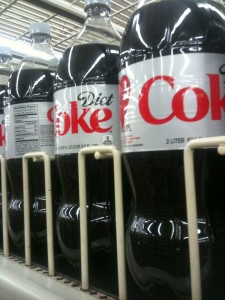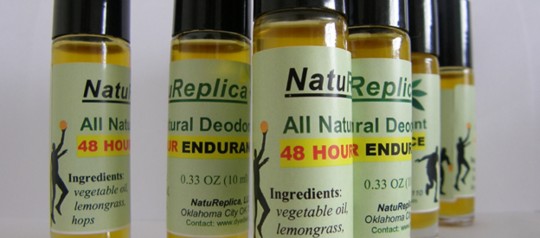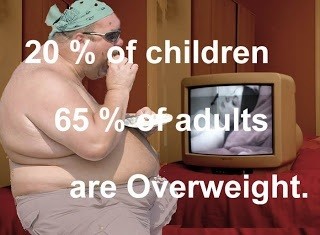Health effects of drinking sodas
 I don’t drink Coca-Cola, Pepsi or Dr Pepper. Why? Well, classic Coke contains too much sugar, 55 g per 0.5 L, so you have to run 2 miles to burn off a bottle of Coke. From the other hand, both diet and, especially, zero Coke are nothing else to me but chemically contaminated water. I do not buy the notion that sugar substitutes, except stevia, are safer than natural sugar in the long run. At a very least, artificial sweeteners are confusing for our body system (read: A Role for Sweet Taste Calorie Predictive Relations in Energy Regulation). Above all, today’s caramel coloring may not be that health innocent as we used to think. Therefore my best drink is pure filtered or mineral water. Of course, occasional bottle of soda would not cause a health problem but if you are a regular drinker, below is a selection of relevant quotations and links that you may need to explore.
I don’t drink Coca-Cola, Pepsi or Dr Pepper. Why? Well, classic Coke contains too much sugar, 55 g per 0.5 L, so you have to run 2 miles to burn off a bottle of Coke. From the other hand, both diet and, especially, zero Coke are nothing else to me but chemically contaminated water. I do not buy the notion that sugar substitutes, except stevia, are safer than natural sugar in the long run. At a very least, artificial sweeteners are confusing for our body system (read: A Role for Sweet Taste Calorie Predictive Relations in Energy Regulation). Above all, today’s caramel coloring may not be that health innocent as we used to think. Therefore my best drink is pure filtered or mineral water. Of course, occasional bottle of soda would not cause a health problem but if you are a regular drinker, below is a selection of relevant quotations and links that you may need to explore.
What we need to know about sugary sodas
5 Surprising Reasons to Drink Water
Of all the food and beverage choices you face every day, what’s calorie-free, virtually cost-free, and, oh yes, essential to keeping you alive? Plain ol’ water. But those aren’t the only reasons to drink it. “Water drives basic body performance,” says Beth Reardon, director of nutrition for Duke Integrative Medicine, part of the Duke University Health System. “All of the systems in the body require water for proper functioning, and so do 90 percent of all chemical reactions in the body.” Here are the top five reasons to quench your thirst with water. – Yahoo Health
3 Surprising Reasons to Give Up Soda
America has a drinking problem. No, not booze. I’m talking about soft drinks. According to the Beverage Marketing Corporation, the average American guzzles 44.7 gallons of the sweet stuff every year. Not sure what 44.7 gallons looks like? It’s about what you’d need to fill a small kiddie pool. But the truth is, you don’t need me to tell you that soda isn’t healthy. We all know that America’s drink of choice contributes to our country’s ever-expanding obesity problem. But, as Rodale.com writer Leah Zerbe discovered, love handles are just the beginning. Read on for her report on three shocking soda facts that will have you saying “Just water, please” from now on. – Yahoo Health
What happens to your body after you drink a soda every day, for a long time
Sugar rushes and caffeine highs followed by a depressing energy crash are what happens to your body if you drink a soda right now, but plenty of Blisstree readers actually seem to be okay with that. Some of you think it’s alarmist to compare a caffeine and sugar rush to doing drugs, and some just don’t really care about the slump they’ll find themselves in after drinking 39 grams of sugar, but what makes us really worried about a soda-slurping habit is what happens over the long term. – Shine
Is caffeine addictive?
…The onset of withdrawal symptoms typically begins 12-24 hours after abstinence, with the peak intensity occurring at 20-51 hours. The withdrawal symptoms last for a range of two to nine days. This is a considerable amount of time that makes it easy to understand why people would have a hard time cutting caffeine from their diet. – MedicineNet.com
Dietitians Are Buying Coke’s Line: Sugar, Fluoride, Artificial Colors are SAFE for Children!
We wish we could say we are surprised. Registered dietitians are now being given formal education by the Coca-Cola Company on how safe its ingredients are. Program materials include gems like “[a] majority of studies so far have not found a link between sugar and behavior in children generally or children diagnosed with attention deficit hyperactivity disorder.” This is certainly news to us, since we have seen many studies that say the opposite. Apparently, the dietitians are to teach us that any connection between the artificial colors and neurotoxicity or fears of the dangers of fluoride is imaginary and come from hysterical (or at least unduly concerned) parents. – ANH-USA
Beverage intake of girls at age 5 y predicts adiposity and weight status in childhood and adolescence
Results: Sweetened beverage intake at age 5 y, but not milk or fruit juice intake, was positively associated with adiposity from age 5 to 15 y. Greater consumption of sweetened beverages at age 5 y (> 2 servings/d) was associated with a higher percentage body fat, waist circumference, and weight status from age 5 to 15 y.
Conclusion: These findings provide new longitudinal evidence that early intake of sweetened beverages predicts adiposity and weight status across childhood and adolescence. – Am. J. Clin. Nutr. 2009; 90:935 – 42
6 Scary Side Effects of Sugar
There’s nothing sweet about how much sugar people consume every day. According to the American Heart Association (AHA), the average adult in the United States takes in 22 teaspoons of added sugar a day, or a whopping 150 pounds a year, while teens pile in 34 teaspoons a day. That’s more than twice the amount of sugar we should be eating… The amount is shocking, and the potential health effects of excess sugar consumption are even scarier. Mounting evidence suggests that flooding your system with the sweet stuff can play a role in obesity, heart disease, and cancer. It can also impact how you look or feel, doing damage to your skin or altering your mood. – Fitbie
But if you choose diet soda, consider this
Donald Rumsfeld and the Strange History of Aspartame
Yes, that Donald Rumsfeld, the “knowns and unknowns” guy who remarkably executed some of the worst decisions in American foreign policy and got a medal for it. I have been reading up on this strange chapter in the history of Donald Rumsfeld and have learned two things. One, the chemical additive aspartame is very potentially a cancer and brain tumor-causing substance that has no place in our food. And two, the reasons and means by which Rumsfeld helped get it approved are nefarious at best, criminal at worst. – The Huffington Post
Diet sodas don’t help with dieting
Two new studies have linked drinking diet soda to poorer health compared with those who don’t drink the beverage. People who said they drank two or more diet sodas a day experienced waist size increases that were six times greater than those of people who didn’t drink diet soda, according to researchers from the University of Texas Health Science Center at San Antonio. A second study that found the sweetener aspartame raised blood sugar levels in diabetes-prone mice. “Data from this and other prospective studies suggest that the promotion of diet sodas and artificial sweeteners as healthy alternatives may be ill-advised,” said study researcher Helen P. Hazuda, professor and at the university’s school of medicine. “They may be free of calories, but not of consequences.” The human study was based on data from 474 participants in a larger, ongoing study called the San Antonio Longitudinal Study of Aging. In that study, the participants were followed for nearly 10 years. Diet soft drink drinkers, as a group, experienced 70 percent greater increases in waist circumference compared with those who don’t drink diet soda. – MSN
Diet Soda Drinkers at 48% Higher Risk of Heart Attack
…new research raises concern about diet soda, finding higher risks for stroke and heart attack among people who drink it every day versus those who drink no soda at all. – NEWSMAXHEALTH
Is it healthy to drink diet soft drinks? The answer is fizzy
For many people, diet soda is an easy way to enjoy a guilt-free, calorie-free sweet treat. But some recent news has raised new concerns about whether it’s healthy to drink calorie-free carbonated soft drinks. Many nutrition and heart experts have pointed out that the research was an observational study that didn’t prove cause and effect. – USA TODAY
Can you get hooked on diet soda?
…Most diet-soda drinkers aren’t as gung ho as Talles, but people who down several diet sodas per day are hardly rare. Government surveys have found that people who drink diet beverages average more than 26 ounces per day (some drink far more) and that 3% of diet-soda drinkers have at least four daily. … Factors besides caffeine are likely at work. Although diet soda clearly isn’t as addictive as a drug like nicotine, experts say the rituals that surround diet soda and the artificial sweeteners it contains can make some people psychologically — and even physically — dependent on it in ways that mimic more serious addictions. And unlike sugared soda, which will make you gain weight if you drink too much of it, zero-calorie soda doesn’t seem to have an immediate downside that prevents people from overindulging. – CNN Health
Caramel Coloring Story
FDA Urged to Prohibit Carcinogenic “Caramel Coloring“
CSPI Says Artificial Caramel Coloring is Quite Different from Real Caramel. WASHINGTON – The “caramel coloring” used in Coca-Cola, Pepsi, and other foods is contaminated with two cancer-causing chemicals and should be banned, according to a regulatory petition filed today by the Center for Science in the Public Interest. – CSPI
Caramel Coloring in Soda: What You Should Know About This Innocent-Sounding Ingredient
One such case is an innocent-sounding ingredient that appears on Coca-Cola, Pepsi, and other soft drinks: “caramel coloring.” Now, I’ve long urged Americans to drink less soda. It’s a nutritionally worthless beverage that provides nothing of benefit to the diet, but whose sugars promote weight gain, obesity, diabetes, and other health problems. Another typical soda ingredient, phosphoric acid, rots teeth. Caffeine is a mildly addictive stimulant drug. – THE HUFFINGTON POST
Lab Tests Find Carcinogen in Regular and Diet Coke and Pepsi
New chemical analyses have found that Coca-Cola, Pepsi-Cola, Diet Coke, and Diet Pepsi contain high levels of 4-methylimidazole (4-MI), a known animal carcinogen. The carcinogen forms when ammonia or ammonia and sulfites are used to manufacture the “caramel coloring” that gives those sodas their distinctive brown colors, according to the Center for Science in the Public Interest, the nonprofit watchdog group that commissioned the tests. CSPI first petitioned the FDA to ban ammonia-sulfite caramel coloring in February 2011. – CSPI
Regulators dispute finding of cancer-causing soda
U.S. regulators said soft drinks from PepsiCo, Inc. and Coca-Cola Co posed no health risk, contrary to a U.S. watchdog group that reported several popular brands contain high levels of a chemical linked to cancer in animals. – Reuters
Pepsi and Coca-Cola to remove carcinogen from their drinks
Coca-Cola and Pepsi are to reformulate their drinks, following a report earlier this week that both contain unacceptably high levels of 4-methylilidazole (4-MI), a chemical that has been linked to cancer in mice and rats. The change has already been made in California, and will be implemented in other states in the near future. “While we believe that there is no public health risk that justifies any such change, we did ask our caramel suppliers to take this step so that our products would not be subject to the requirement of a scientifically unfounded warning,” Coca-Cola representative Diana Garza-Ciarlante told the Associated Press news agency. The report, from consumer watchdog the Center for Science in the Public Interest (CSPI), says that some soft drinks contain five times the amount of the chemical deemed safe in California. – Ingredients Network
Now, after considering all the above, it is up you to decide what to choose for your best thirst quencher. Make less risky food choices for you and your family!
Category: American diet, Soft drinks
Comments (8)
Trackback URL | Comments RSS Feed
Sites That Link to this Post
- Articles of Interest | July 9, 2012







I like to drink soda, but why would you even say that? I just LOVE drinking soda.
It’s just so delightful!
The critical point is that YOU know WHAT are you doing. In the same time many ads are misleading to say the least. If you choose to take health risks, this is your choice which everybody should respect.
What’s actually stupid about having too much sugar:
1. It causes memory loss
2. Having too much sugar in the first place
Oh, yeah.. You are right. Too much sugar may contribute into the development of Alzheimer’s disease:
http://health.yahoo.net/experts/dayinhealth/does-sugar-cause-dementia
I used to drink 3-5 cans of soda a day, including Coke, Sprite, and Inca Kola. How can I stop a soda addiction? I don’t want to die young.
This is difficult question. I am not a doctor to make recommendations with regard to addiction. I can only guess that physical activity,
exercising plus some of your will power may help.
I have been fantasizing about having grape soda, but when I found out about that much of chemicals, I decided not to buy it. What can I drink instead? Water is too boring, and I want something grape flavored.